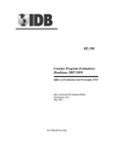Country Program Evaluation: Honduras (2007-2010)
Date
May 2011
This evaluation examines the IDB's Country Program with Honduras for the 2007-2010 period. This period was marked by a political crisis that halted operations with the country from June 2009 to March 2010. Honduras set out to achieve 120 development objectives in its work with the IDB during the period under evaluation. Despite its importance, in practice, these goals exceeded the country's delivery capacity as well as IDB's monitoring capacity. Although both Honduras and the IDB had identified 'reducing poverty and indigence' as the overarching development challenge, institutional shortcomings made it impossible to translate that shared objective into priorities and specific resource allocations. This was detrimental to the program's relevance. Efficiency was low as chronic shortcomings in management capacity translated into lengthy delivery times and high implementation costs. Limitations in the monitoring and evaluation system can be improved, since the effectiveness of the program could not be measured, as no causal relationship can be established between the country¿s progress and IDB's action. The recommendations aim at optimizing what is already a solid country-IDB relationship. To this end, the IDB should pursue opportunities to continue strengthening three key functions in its dealings with the country: (i) programming; (ii) execution; and (iii) monitoring and evaluation.



